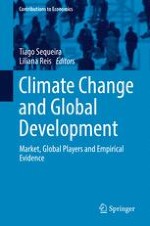2019 | OriginalPaper | Buchkapitel
Global Development and Climate Change: A Game Theory Approach
verfasst von : António Bento Caleiro, Miguel Rocha de Sousa, Ingo Andrade de Oliveira
Erschienen in: Climate Change and Global Development
Verlag: Springer International Publishing
Aktivieren Sie unsere intelligente Suche, um passende Fachinhalte oder Patente zu finden.
Wählen Sie Textabschnitte aus um mit Künstlicher Intelligenz passenden Patente zu finden. powered by
Markieren Sie Textabschnitte, um KI-gestützt weitere passende Inhalte zu finden. powered by
